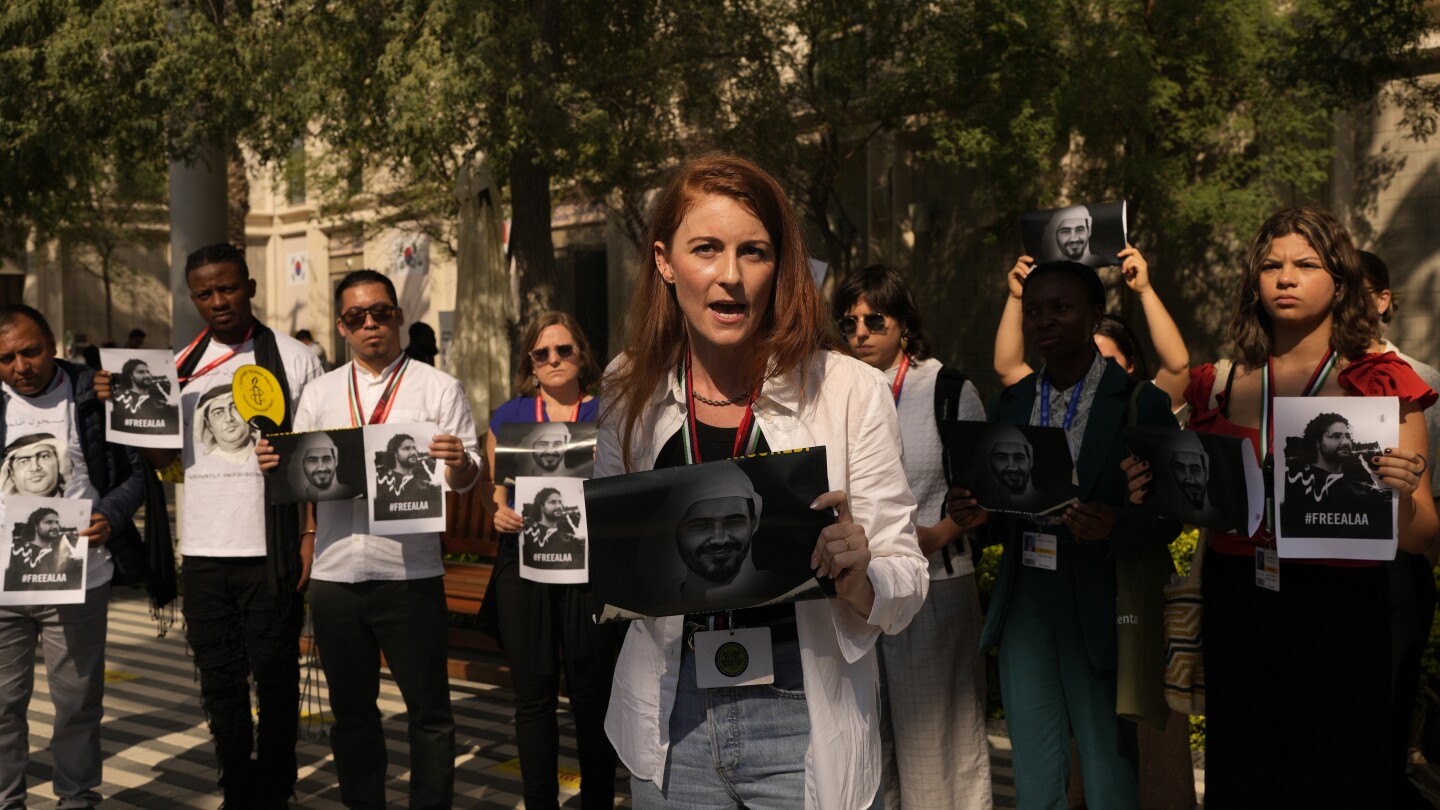DUBAI, United Arab Emirates (AP) — Protesters at the United Nations’ COP28 climate summit demonstrated Saturday for imprisoned human rights activists in Egypt and the United Arab Emirates, the past and current host of the negotiations.
Demonstrators carried signs bearing the image of Emirati activist Ahmed Mansoor and Egyptian pro-democracy activist Alaa Abdel-Fattah, part of incredibly restricted, but still-unprecedented protests being allowed to take place within the UAE from within the U.N.-administered Blue Zone for the summit.
However, just before the demonstration organized by Amnesty International and Human Rights Watch, protesters had to fold over signs bearing the Emirati detainees’ names — even after they already had crossed out messages about them. The order came roughly 10 minutes before the protest was due to start from the U.N., which said it could not guarantee the security of the demonstration, said Joey Shea, a researcher at Human Rights Watch focused on the Emirates.
“It is a shocking level of censorship in a space that had been guaranteed to have basic freedoms protected like freedom of expression, assembly and association,” Shea told The Associated Press.
While speaking during the protest, Shea also had to avoid naming the Emirates and Egypt as part of the U.N.’s rules.
“The absurdity of what happened at this action today speaks volumes,” she added.
The Emirati government and the Emirati organization in charge of COP28 did not immediately respond to a request for comment.
Mansoor, the recipient of the prestigious Martin Ennals Award for Human Rights Defenders in 2015, repeatedly drew the ire of authorities in the United Arab Emirates, calling for a free press and democratic freedoms in this autocratic federation of seven sheikhdoms. He had been targeted with Israeli spyware on his iPhone in 2016 likely deployed by the Emirati government ahead of his 2017 arrest and sentencing to 10 years in prison over his activism.
Abdel-Fattah, who rose to prominence during the 2011 pro-democracy Arab Spring uprisings, became a central focus of demonstrators during last year’s COP27 in Sharm el-Sheikh, Egypt, as he had stopped eating and drinking water to protest his detention. He has spent most of the past decade in prison because of his criticism of Egypt’s rulers.
Since 2013, President Abdel-Fattah el-Sissi’s government has cracked down on dissidents and critics, jailing thousands, virtually banning protests and monitoring social media. El-Sissi has not released Abdel-Fattah despite him receiving British citizenship while imprisoned and interventions on his behalf from world leaders including U.S. President Joe Biden.
Demonstrators also held up the image of Mohamed al-Siddiq, another Emirati detained as part of the crackdown. Emiratis in white thobes walked or rode past the protest in carts, looking on in curiosity. The protest had been scheduled to take place days earlier, but negotiations with U.N. officials dragged on — likely due to the sensitivity of even mentioning the detainees’ names in the country.
Meanwhile Saturday, protesters briefly stage a sit-in at OPEC’s stand over a leaked letter reportedly calling on cartel member states to reject any attempt to include a phase-down of fossil fuels in any text at the summit.
Organizers cancelled a later event on food security put on by the Heschel Center for Sustainability, an Israeli organization, after pro-Palestinian activists wearing keffiyehs wanted to attend. The Israel-Hamas war has cast a long shadow over the ongoing climate talks, with pro-Palestinian demonstrations and comments from world leaders.
___
Associated Press journalist Peter Dejong contributed.
___
Associated Press climate and environmental coverage receives support from several private foundations. See more about AP’s climate initiative here. The AP is solely responsible for all content.
#Protesters #COP28 #climate #summit #demonstrate #imprisoned #Emirati #Egyptian #activists











Leave a Reply